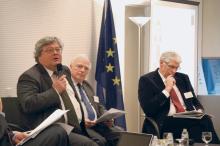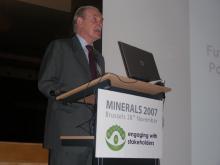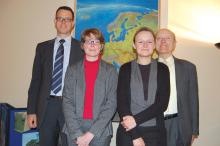
Resource efficiency and sustainability were the main topics discussed at the European aggregates association's recent dinner debate in Brussels
Today's pace of life often means there is little time to gather together and talk through the major issues facing the sector but the
The event held in Brussels in April drew together industry experts, decision makers and stakeholders from across Europe to discuss the challenges resource efficiency and sustainability present to the sector
The event was hosted by Netherlands MEP Judith Merkies, who is rapporteur of the Innovation Union, and helped to focus the discussions on 'Resource Efficiency and Innovation' as well as the second pillar of the Raw Materials Strategy 'Fostering Sustainable Supply within the EU'
According to the European Aggregates Association (
Efficiency
The first issue of resource efficiency brought to the debate the various approaches of the different sectors
Germany's MEP Reinhard Bütikhofer and parliamentary rapporteur on the Raw Materials Strategy, considered that this was "the pillar with the greatest potential", a theme further pursued by Judith Merkies, and Vladko Todorov Panayotov, shadow rapporteur
The metallic minerals sector, particularly for the critical materials, emphasised the concept of 'resource efficiency' being about the total life-cycle, for other minerals it was about "urban mining". The cement industry identified the term as co-processing. For the aggregates industry 'resource efficiency' meant sustainable transport and recycling of construction and demolition materials. However, one common point for all sectors was that everyone was committed to resources efficiency
In fact, all sectors are promoting good practice and innovative projects in their individual sector, and therefore have actively followed up the Innovation Union Partnership request for proposals. The UEPG said that the Green Week Conference 2011 in Brussels on resource efficiency at the end of May presented another opportunity to follow up the former discussions. These talks are likely to continue at the Road map on Resource Efficiency event that is planned for June
Sustainability
With regards to fostering sustainable supply, MEPs and industry speakers delivered the same key message - the importance of access to regional and local resources, and the fact that sustainable access to resources leads to sustainable construction. Spanish MEP Ramon Tremosa i Balcells underlined the need for 'sustainable supply from European sources'. In that context, Paul Páez- Maletz and Christoph Schäffer made reference to SMEs, highlighting their own experience
The RMI report referring to sharing good practices emphasised the need for better mineral planning and more efficient permitting systems. The sector's record now also proves that responsible industry can indeed work in harmony with conservation areas, and indeed enhance biodiversity
The discussions concluded that these key conclusions of the RMI must not be let to gather dust or be forgotten through inaction
UEPG president Jim O'Brien concluded the event and called on the Parliament and Commission to press on Member States to implement better planning and permitting systems in their own ways in the various Member State legislative systems. For SMEs in particular, good minerals planning and effective permitting is essential to survival
The event was also used to present a minerals industries' paper with a common voice on the Raw Material Strategy & Resource Efficiency stressing the priorities and actions of the industries. The next step is to continue informing MEPs on the benefits of industry's positive actions and work for a sustainable society.









